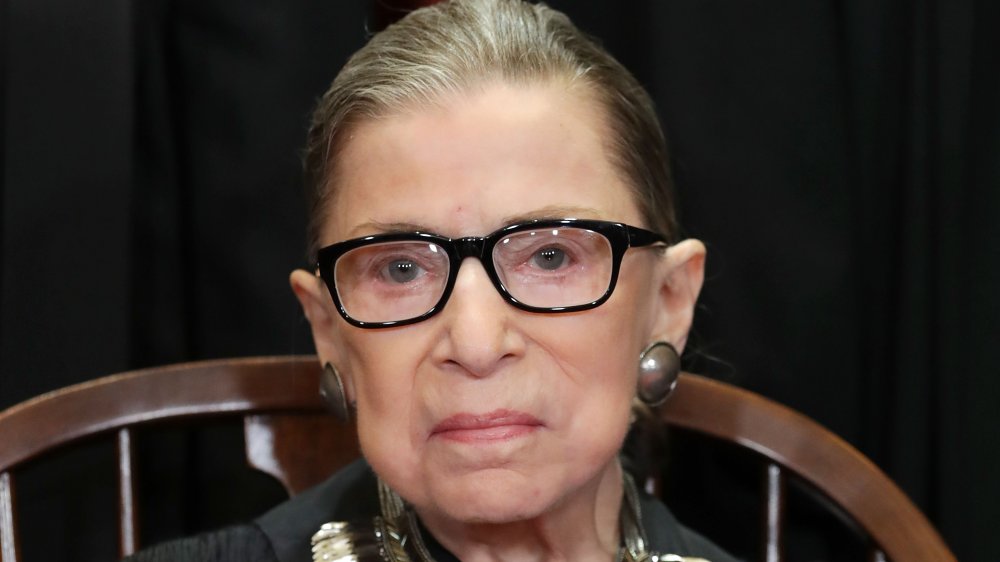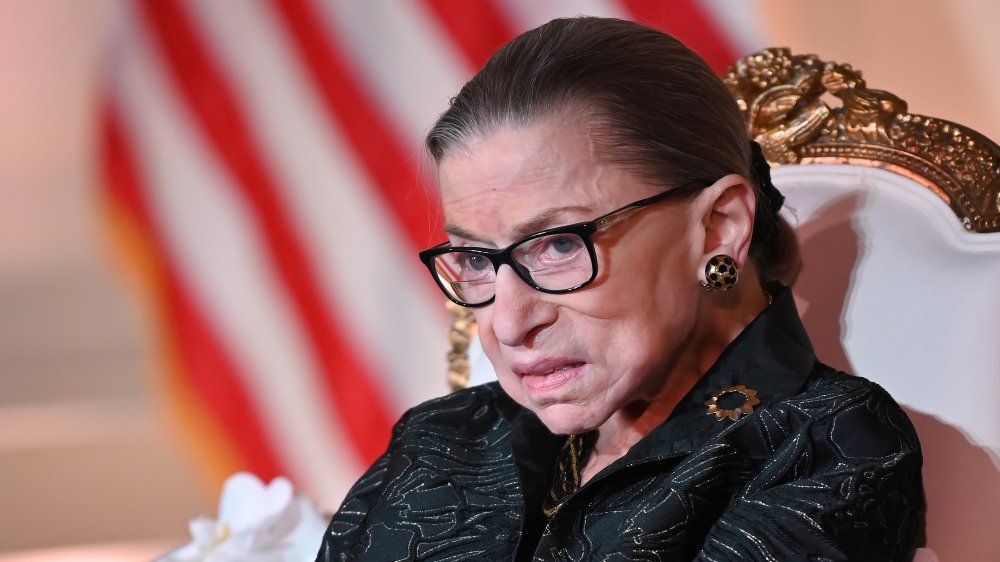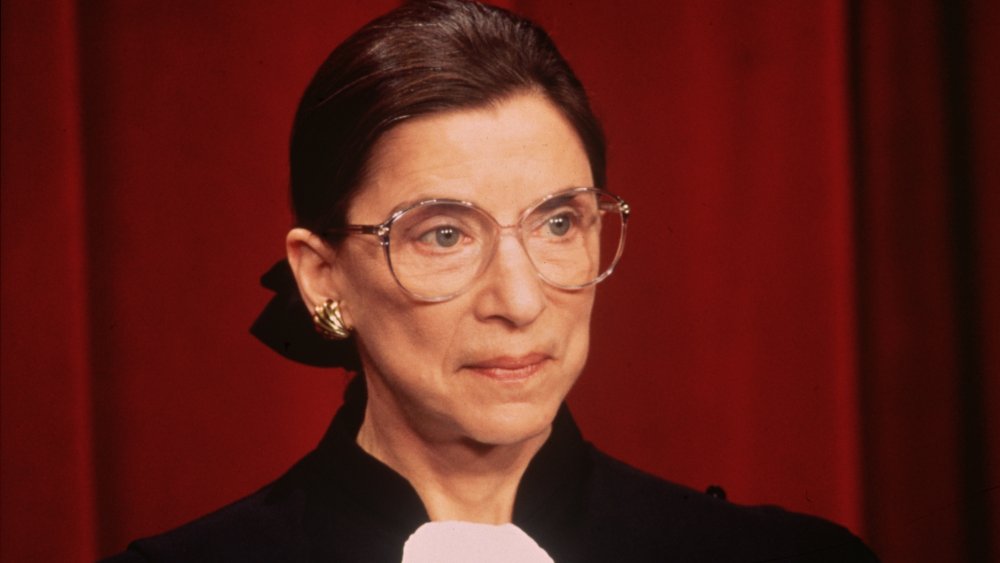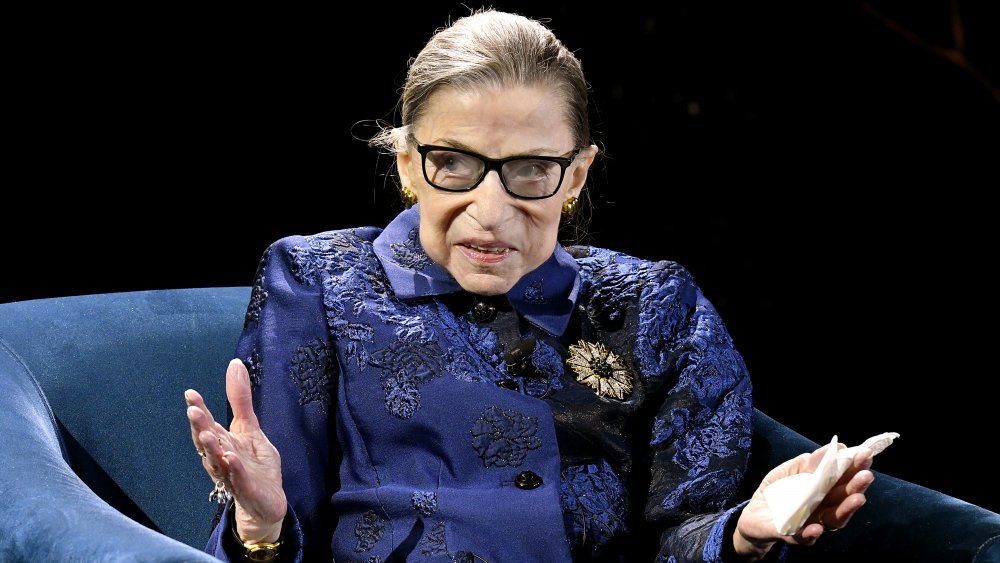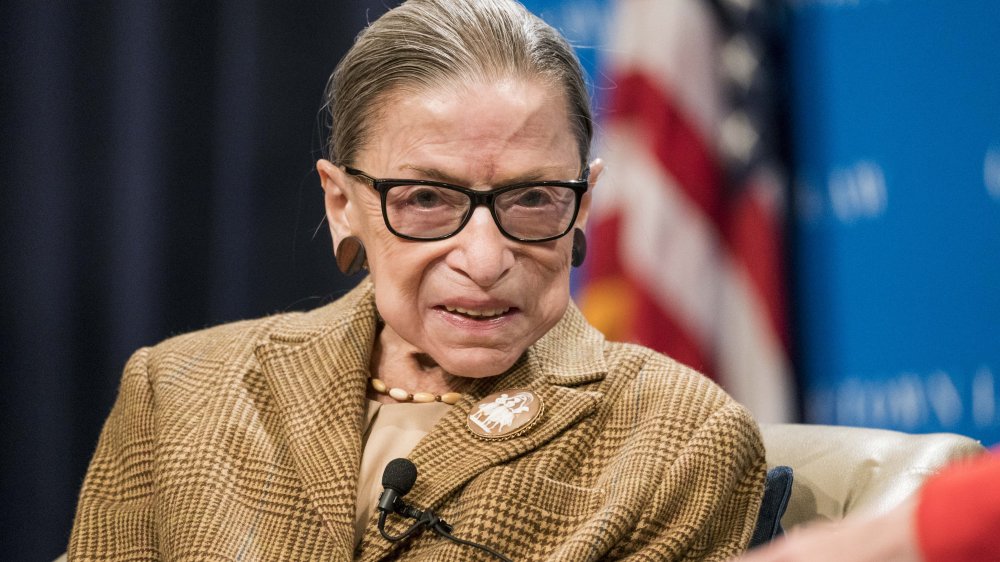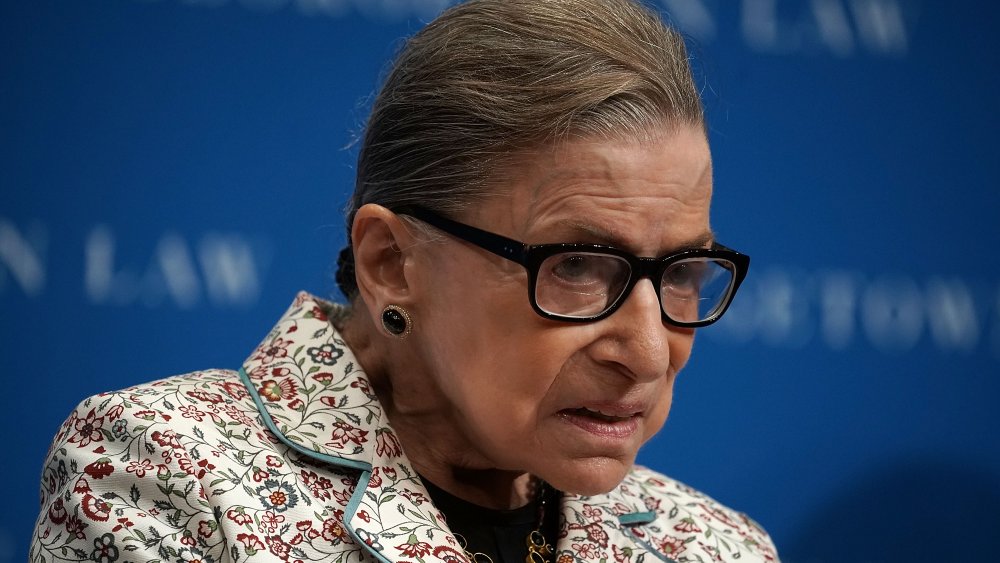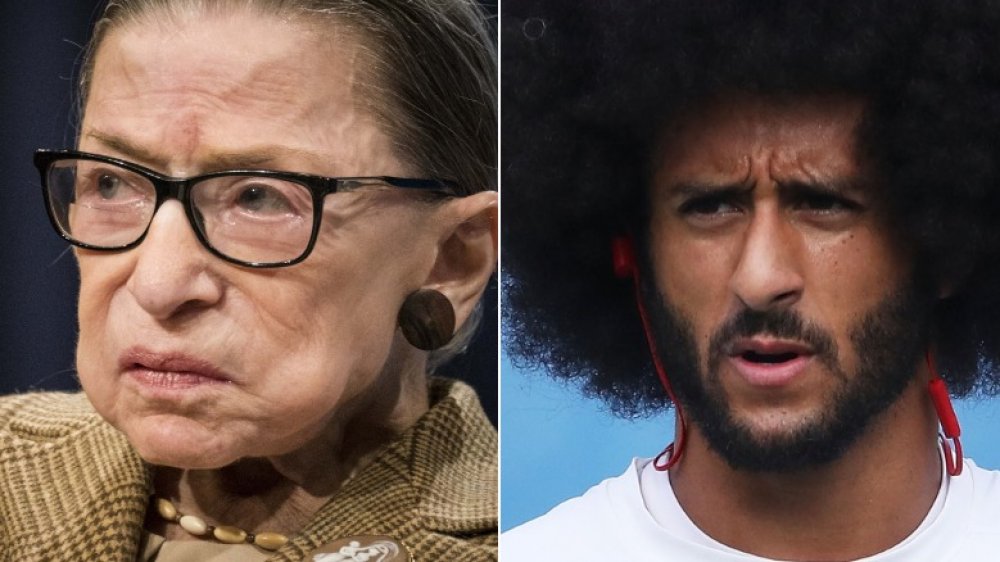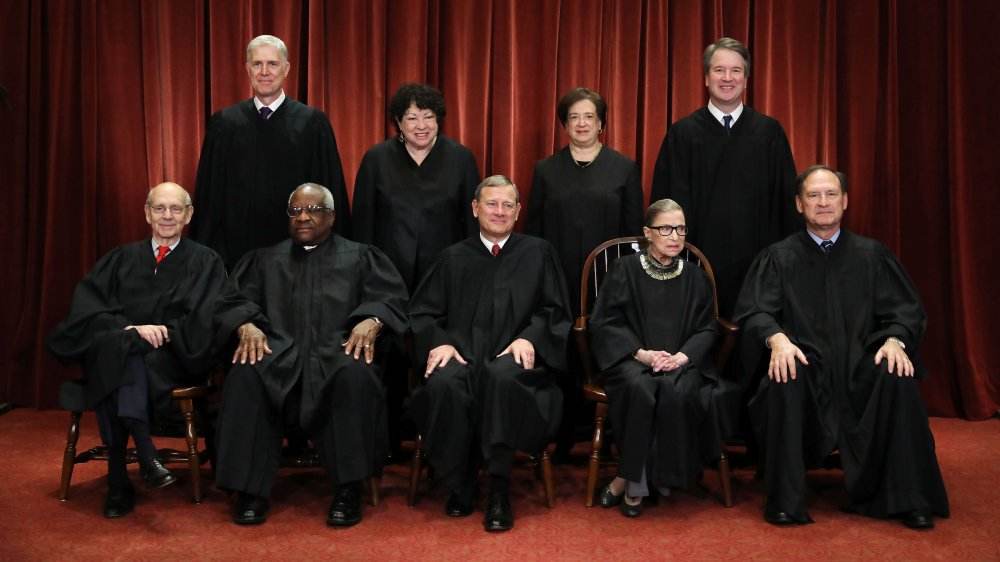Tragic Details About Ruth Bader Ginsburg
On September 19, 2020, Justice Ruth Bader Ginsburg passed away due to complications of metastatic pancreatic cancer, The New York Times reported. She was 87. Nominated by former President Bill Clinton, Ginsburg became the second woman to serve on the Supreme Court when she received her commission on August 5, 1993. While her decisions on indigenous rights and immigration were mixed, she is widely known as a liberal and feminist icon for her pioneering advocacy for women's rights that earned her rock star status and the nickname "Notorious RBG" later in life.
"We have lost one of the most extraordinary Justices ever to serve on the Supreme Court. Ruth Bader Ginsburg's life and landmark opinions moved us closer to a more perfect union. And her powerful dissents reminded us that we walk away from our Constitution's promise at our peril," Clinton tweeted the day of her death.
But what else do we know about the life of the legendary Justice? From loss early in life to numerous health challenges, let's convene for the tragic details about Ruth Bader Ginsburg.
She lost her older sister and mother before she graduated high school
Born Joan Ruth Bader on March 15, 1933, in Brooklyn, NY, Ginsburg was the second (and last) child of Nathan and Celia Bader. Unfortunately, tragedy struck early. When Ginsburg was only 14 months old, her elder sister died of meningitis at the age of six (via Britannica).
Then, when Ginsburg was set to start high school, her mother was diagnosed with cancer and died the day before Ginsburg's graduation ceremony. While accepting the nomination to the Supreme Court, Ginsburg described her mother as "the bravest and strongest person I have known, who was taken from me much too soon" (via U.S. News). "I pray that I may be all that she would have been had she lived in an age when women could aspire and achieve and daughters are cherished as much as sons."
However, the lessons her mother taught her remained with Ginsburg her entire life. "My mother told me two things constantly. One was to be a lady, and the other was to be independent. The study of law was unusual for women of my generation. For most girls growing up in the '40s, the most important degree was not your B.A., but your M.R.S." Ginsburg once said (via ACLU).
Ruth Bader Ginsburg's first cancer diagnosis
Six years into her Supreme Court career, Ruth Bader Ginsburg was diagnosed with colon cancer. She underwent surgery and "precautionary" chemotherapy and radiation treatments but insisted her health ordeal would not interfere with her work (via the Los Angeles Times). "In consultation with Dr. Leonard Saltz of Memorial Sloan-Kettering Center in New York, I have been undergoing a precautionary, post-surgery course of chemotherapy and radiation at Washington Hospital Center," Ginsburg said at the time.
Her treatments reportedly lasted six months, and Ginsburg stated they had "not affected [her] schedule at the court," and revealed her surgery resulted in "a complete, successful, surgical removal of colorectal cancer." Her doctors confirmed at the time that her cancer had not spread further.
"Following the treatments, it is anticipated that I will require only routine examinations to assure my continuing good health," Ginsburg said. It was during one of those routine examinations, a decade later, when a CT scan found a single lesion on her pancreas.
She had health problems during the Obama years
In 2009, at the age of 75, Ruth Bader Ginsburg had surgery of "early-stage pancreatic cancer," according to The Washington Post. Due to her advanced age and the low survival rate of pancreatic cancer, many believed it could lead then-President Obama to appoint his first Supreme Court Justice. Ginsburg remained on the bench.
Five years later, at the age of 81, Ginsburg "experienced discomfort during routine exercise" and was rushed to MedStar Washington Hospital Center, the court said in a statement (via The New York Times). While there, Ginsburg underwent heart surgery, and doctors placed a stent on her right coronary artery. Now by this time, considering Ginsburg's multiple health issues, many liberal votes starting calling for Ginsburg to retire so Obama could replace her with a younger justice.
A year prior, Ginsburg dismissed the notion that a Republican president would ever replace her after Obama left office. "I think it's going to be another Democratic president," she said (via The Washington Post). "The Democrats do fine in presidential elections; their problem is they can't get out the vote in the midterm elections." In 2019, Ginsburg explained her reasons for not stepping down. "When that suggestion is made, I ask the question: Who do you think the president could nominate that could get through the Republican Senate? Who you would prefer on the court than me?" she said (via CNBC). Hindsight is 20/20, as they say.
Her health issues during the Trump years
Ruth Bader Ginsburg's health problems returned two years into the Trump presidency. In November 2018, Ginsburg fell in her office and fractured three of her ribs. After "experiencing discomfort overnight," she went to the hospital, and the fractures were discovered (via NPR). While in the hospital, doctors found she had lung cancer while performing CT scans of her ribs.
She then underwent surgery to remove one lobe of her lung. "Currently, no further treatment is planned. Justice Ginsburg is resting comfortably and is expected to remain in the hospital for a few days," the court said in a statement (via NPR). In August 2019, Ginsburg received radiation treatment after a tumor was found on her pancreas. "As part of her treatment, a bile duct stent was placed," the court said (via NPR).
Her cancer returned in May 2020. According to CNN, Ginsburg was rushed to Johns Hopkins Hospital after experiencing "fever and chills." In a statement, Ginsburg said: "I am tolerating chemotherapy well and am encouraged by the success of my current treatment." Two weeks prior to her death, Ginsburg officiated a wedding without a mask during the COVID-19 pandemic weeks after she was hospitalized. "2020 has been rough, but yesterday was Supreme," the bride, Barb Solish, captioned a Twitter photo (via Scary Mommy).
Ruth Bader Ginsburg lost her husband to cancer
On June 27, 2010, Ruth Bader Ginsburg lost her husband, Martin D. Ginsburg, due to complications from metastatic cancer (via The Washington Post). He was 76. Martin passed away in their home four days after the couple's 56th wedding anniversary. Martin, who did all the cooking in the relationship, jokingly explained how the pair maintained such a long marriage. "As a general rule," he told The New York Times (via The Washington Post) in 1997, "my wife does not give me any advice about cooking, and I do not give her advice about the law. This seems to work quite well on both sides."
During a 2019 interview with NPR, Ginsburg reflected on their romance and how much he missed him. She also revealed how he once saved her life during her first bout with cancer. "There was one day during [the] colon cancer bout when I was getting a blood transfusion, and Marty saw that something was very wrong," she explained, "and he immediately yanked the needle out of me. It turned out that there was a mismatch not in the type of blood but in some antigen. I might not have lived it if he hadn't been there."
After his death, Ginsburg revealed her work on the Supreme Court helped her to go on. "The work is really what saved me," she said. "So I had to get past whatever my aches and pains were. Just do the job."
Ruth Bader Ginsburg criticized Colin Kaepernick for protesting
During a preseason game in 2016, former quarterback Colin Kaepernick kneeled for the first time during the National Anthem to protest racial injustice and police brutality. This act of defiance set off a wave of athletes partaking in the demonstration and a national discussion about patriotism vs. protest. Ruth Bader Ginsburg did not agree with Kaepernick's stance. "I think it's dumb and disrespectful," she told Yahoo's, Katie Couric.
She didn't stop there. When asked if she thought Kaepernick's actions were offensive, she said, "Yes. If they want to be stupid, there's no law that should be preventive. If they want to be arrogant, there's no law that prevents them from that. What I would do is strongly take issue with the point of view that they are expressing when they do that." Yikes. Kaepernick called Ginsburg's comments "disappointing" and meant to "de-legitimize" the meaning of the protest (via The Mercury News).
Later that month, Ginsburg issued a statement calling her comments "inappropriately dismissive and harsh" and said she "should have declined to respond" (via CNN). She also added that she was "barely aware of the incident or its purpose." Ginsburg issued this apology two years after the Ferguson riots in response to the shooting death of Michael Brown and a year after the death of Freddie Gray while in police custody.
She called Brett Kavanaugh a 'very decent and very smart' man
While his name was on Donald Trump's shortlist of potential nominees to replace Justice Anthony Kennedy, Brett Kavanaugh was accused of sexual assault by Christine Blasey Ford while the two were in high school (via The Washington Post). On September 27, 2018, Ford appeared before the Senate Judiciary Committee and told her account of the alleged assault. "I am here today not because I want to be," Ford said in her opening statement before her four-hour testimony (via Time). "I am terrified." Kavanaugh also testified and vehemently denied the allegations.
Protests immediately broke out across the country, citing Kavanaugh would potentially overturn Roe v. Wade. Protestors, many of whom dressed in costumes from The Handmaid's Tale, voiced their concerns. However, less than two weeks later, Kavanaugh was confirmed to the Supreme Court "by one of the slimmest margins in American history" (via The New York Times).
A year later, Ruth Bader Ginsburg called Kavanaugh as "very decent and very smart [individual]" and praised him for having an "entire staff" full of women (via CNN). During a 2009 interview with The New York Times, Ginsburg had this to say about Roe v. Wade: "Frankly I had thought that at the time Roe was decided, there was concern about population growth and particularly growth in populations that we don't want to have too many of."
Donald Trump plans to fill her seat immediately
According to NPR, Ruth Bader Ginsburg did not want her seat filled by a President Trump nominee. "My most fervent wish is that I will not be replaced until a new president is installed," she told her granddaughter, Clara Spera, days before her death. However, on the day of her death, Senate Majority Leader Mitch McConnell released a statement "mourn[ing] the sudden passing of Justice Ruth Bader Ginsburg and the conclusion of her extraordinary American life," adding that "President Trump's nominee will receive a vote on the floor of the United States Senate."
Trump agreed. "We were put in this position of power and importance to make decisions for the people who so proudly elected us, the most important of which has long been considered to be the selection of United States Supreme Court Justices. We have this obligation, without delay!" he tweeted.
During a rally the next day in Fayetteville, NC, Trump said he would be nominating a woman (via CNN). "So, Article 2 of the Constitution says that the President shall nominate justices of the Supreme Court. I don't think it can be any more clear, can it?" he said. He was then met with chants from the crowd urging him to "fill that seat!"

